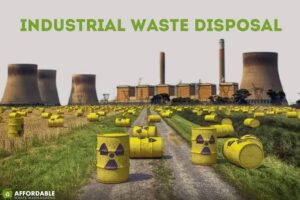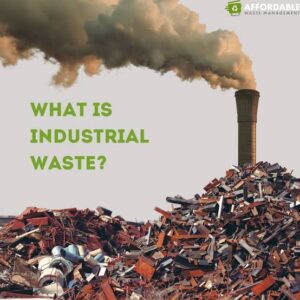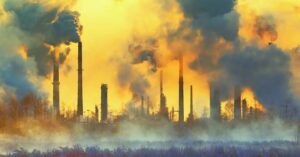Back to: Environmental Biology 300 Level
Welcome to class!
Hello, bright scholar! Have you ever walked past a factory and noticed thick smoke or foul-smelling water flowing from pipes into nearby streams? That’s industrial pollution in action—and it’s a serious environmental concern in Nigeria. But with the right knowledge and responsible actions, we can manage industrial waste and prevent long-term damage to our environment and health. Let’s learn how.
Industrial Pollution And Waste Management
What is Industrial Pollution?
Industrial pollution refers to the release of harmful substances into the environment by manufacturing or processing industries. This includes waste from oil refineries, textile mills, breweries, cement factories, mining operations, chemical plants, and more. In Nigeria, industrial zones like Lagos, Port Harcourt, Kano, and Warri face serious pollution from air emissions, effluent discharges, and solid waste dumps.

Types of Industrial Pollution and Examples
Air Pollution: Caused by burning fossil fuels in factories, releasing harmful gases like carbon monoxide, sulphur dioxide, and nitrogen oxides.
Example: The black soot crisis in Port Harcourt was worsened by industrial emissions and illegal refineries.
Water Pollution: Occurs when untreated industrial wastewater is discharged into rivers and streams.
Example: In the Niger Delta, oil spills from extraction and refining have polluted rivers, killing aquatic life and affecting fishing communities.
Soil Contamination: Caused by the disposal of hazardous chemicals and heavy metals into landfills.
Example: Open dumps near Onitsha have led to leaching of toxic substances into surrounding farmland.

Industrial Waste Management Strategies
Proper management of industrial waste involves planning, regulation, technology, and responsibility. Key methods include:
1. Waste Reduction at Source
Industries are encouraged to use raw materials efficiently, redesign production processes, and avoid wasteful packaging. This is called cleaner production.
2. Recycling and Resource Recovery
Materials like metal scraps, plastic, paper, and even used oil can be recycled or reused in the same or different industries.
Example: Aluminium recycling plants in Nigeria help reduce waste and save energy.
3. Waste Treatment
Liquid waste must be treated in Effluent Treatment Plants (ETPs) before being released into the environment.
Example: Many breweries in Nigeria now have ETPs to treat wastewater before discharge.
4. Secure Landfilling
For hazardous waste, secure engineered landfills with leachate collection systems are used to prevent soil and groundwater contamination.
5. Incineration
This method involves controlled burning of toxic and medical waste in special furnaces. While it reduces waste volume, it must be regulated to avoid releasing dangerous gases.
6. Policy and Regulation
NESREA ensures that industries comply with Nigeria’s environmental laws, including proper waste disposal and pollution control. Industries must submit Environmental Impact Assessment (EIA) reports and undergo environmental audits. Failure to comply can lead to fines, closure, or prosecution.
7. Public-Private Partnership and Awareness
Industries, governments, and communities must work together. Environmental education, transparent reporting, and community monitoring encourage industries to act responsibly.
Challenges in Nigeria
Poor enforcement of environmental laws

Weak infrastructure for waste treatment
Corruption and lack of political will
Low public awareness
High cost of eco-friendly technology
Despite these challenges, more Nigerian companies are embracing sustainable practices, especially with pressure from international partners and local communities demanding cleaner operations.
Summary
- Industrial pollution includes air, water, and soil pollution caused by industrial activities.
- Major Nigerian pollution cases include oil spills in the Niger Delta and soot in Port Harcourt.
- Waste management strategies include source reduction, recycling, waste treatment, secure landfilling, and incineration.
- NESREA and EIA regulations help enforce proper industrial pollution control.
- Key challenges include poor enforcement, low awareness, and lack of modern waste treatment systems.
Evaluation
- Define industrial pollution with a Nigerian example.
- List three types of industrial pollution and their sources.
- What are the major methods of managing industrial waste in Nigeria?
- Explain the role of NESREA in pollution control.
- Mention two challenges facing industrial pollution control in Nigeria.
You’ve just explored a topic that affects millions of lives across Nigeria. Now you’re equipped with real knowledge to be part of the solution. You’re not just learning—you’re preparing to lead. Keep pushing forward. Afrilearn is always proud to stand beside you on this journey!
